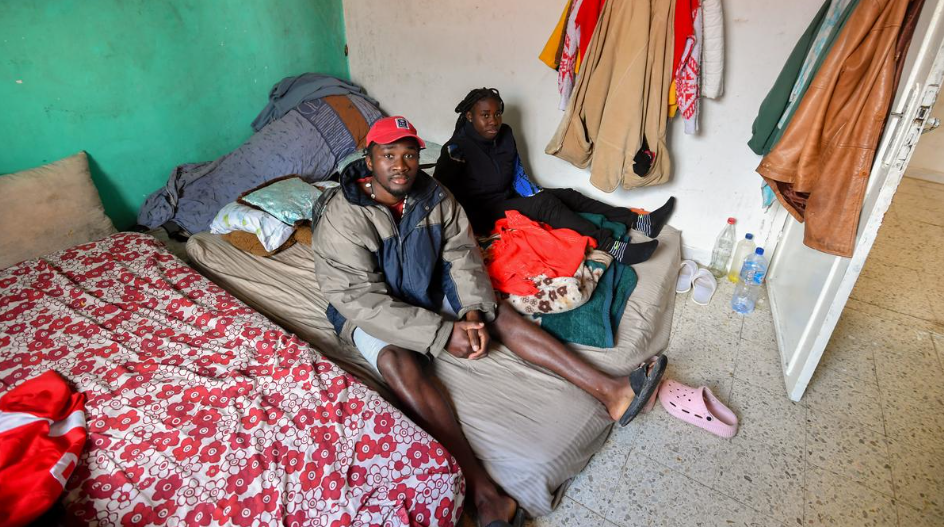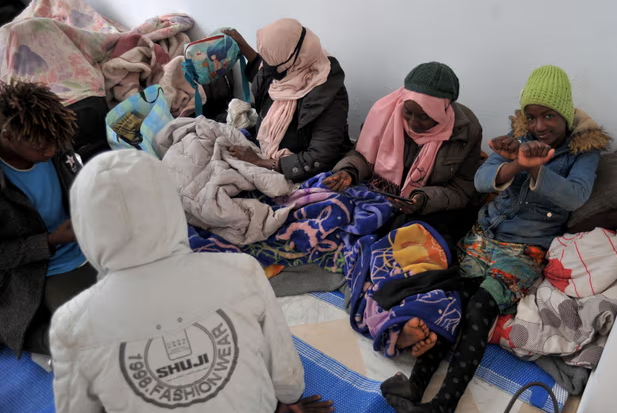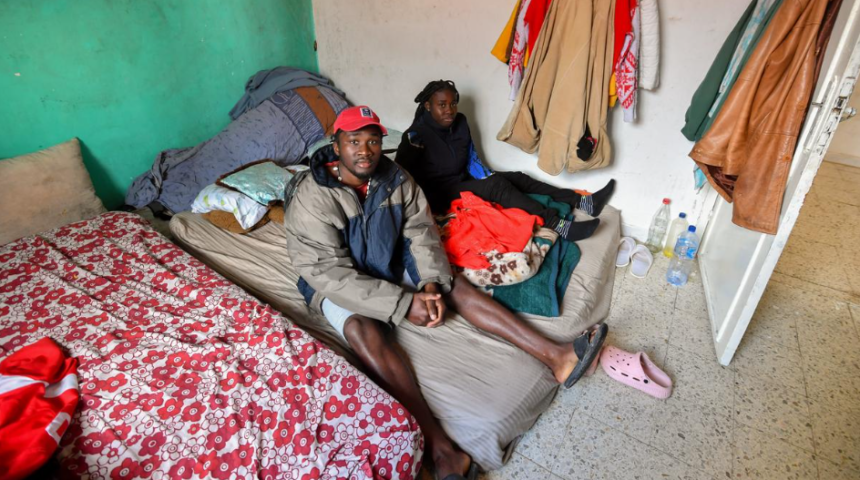Anti-Migrant Sentiment A surge in anti-migrant sentiment in Tunisia has placed thousands of Sub-Saharan African migrants in an increasingly precarious situation. Amid growing economic hardship, political instability, and inflammatory rhetoric, migrants from countries such as Ivory Coast, Guinea, Mali, and Chad are facing rising levels of violence, Anti-Migrant Sentiment discrimination, and forced expulsions.
Once considered a transit country for migrants hoping to reach Europe, Tunisia has become a hostile environment for many Sub-Saharan Africans, Anti-Migrant Sentiment with crackdowns intensifying and xenophobic attacks on the rise. Reports from human rights organizations, migrants, and activists indicate a sharp deterioration in living conditions, with many stranded without shelter, food, or legal protections.
The crisis has drawn international condemnation, with the African Union (AU), the United Nations (UN), and humanitarian organizations urging Tunisian authorities to protect the rights and dignity of migrants. However, Anti-Migrant Sentiment with economic pressures mounting and political rhetoric fueling anti-migrant sentiment, many fear that the situation will only worsen in the coming months.
The Rise of Anti-Migrant Sentiment in Tunisia
Tunisia has long been a key location for migrants attempting to cross the Mediterranean Sea into Italy and other European countries. However, Anti-Migrant Sentiment recent political and economic instability has fueled resentment toward migrants, leading to:
- Government crackdowns and deportations
- Violent attacks against Sub-Saharan Africans
- Evictions, job losses, and racial discrimination
- Stranded migrants with no legal protection or resources
Political Rhetoric and Its Impact
The anti-migrant sentiment escalated sharply in 2023, Anti-Migrant Sentiment after Tunisian President Kais Saied made inflammatory statements suggesting that Sub-Saharan migration was part of a conspiracy to change Tunisia’s demographic makeup. His remarks echoed far-right rhetoric seen in Europe and the U.S., triggering a wave of xenophobic attacks and government crackdowns.
- February 2023: President Saied claimed that an influx of Sub-Saharan Africans was part of an attempt to “replace” the Tunisian identity, fueling panic and hate speech against migrants.
- Mass arrests and evictions followed, with authorities rounding up migrants and expelling them to Libya and Algeria, often leaving them stranded in the desert.
- Tunisian citizens, emboldened by the government’s stance, attacked migrants, Anti-Migrant Sentiment destroyed their homes, and forced them out of jobs.
Result: Thousands of migrants were left homeless and vulnerable, Anti-Migrant Sentiment without access to food, shelter, or medical care.  For the more information click on this link
For the more information click on this link
Migrants Face Violence and Expulsions
The crackdown on migrants has led to widespread violence, racial profiling, and forced deportations. Human rights organizations report escalating abuses against Sub-Saharan Africans, including:
1. Physical Attacks and Harassment
Many migrants have reported:
- Being physically assaulted by both citizens and security forces.
- Facing verbal abuse and racist attacks in public spaces.
- Being evicted from homes overnight and left without shelter.
📍 Testimony from a migrant from Ivory Coast:
“I was attacked on the street by a group of men. They told me I don’t belong here. My landlord threw me out without notice. I have nowhere to go.”
2. Arbitrary Arrests and Detentions
- Authorities have conducted mass arrests of migrants, Anti-Migrant Sentiment detaining them in overcrowded and unsanitary conditions.
- Many have been expelled to remote desert areas, often with no food, water, or means of survival.
📍 Report from Amnesty International:
“The mass expulsions of migrants, including families and children, Anti-Migrant Sentiment without due process is a blatant violation of human rights.”
3. Economic Hardships and Job Losses
- Migrants, many of whom were employed in construction, domestic work, and agriculture, have lost their jobs due to discrimination and fear of reprisals.
- Some employers, under government pressure, have fired Sub-Saharan workers, leaving them without income.
📍 Migrant from Guinea:
“I worked as a laborer, but after the President’s speech, my boss told me not to come back. Now I live in an abandoned building with no money.”
Tunisia’s Role as a Migration Transit Hub
For years, Tunisia has been a key transit point for migrants attempting to reach Europe. However, with the EU pressuring Tunisia to prevent migration, Anti-Migrant Sentiment and the Tunisian government cracking down on migrants, the situation has become dire.
1. EU-Tunisia Migration Deal
- The European Union (EU) has funded Tunisia to curb migration, Anti-Migrant Sentiment providing millions of euros in aid.
- In return, Tunisian authorities have intensified efforts to stop migrant boats and deport Sub-Saharan Africans.
- Critics argue that the EU’s approach has fueled human rights violations, as Tunisia expels migrants without due process.
📍 Human Rights Watch Report:
“The EU is outsourcing its border policies to Tunisia, knowing full well that migrants there face severe abuse and lack protections.”
2. Dangerous Mediterranean Crossings
- Many migrants, fearing violence in Tunisia, Anti-Migrant Sentiment are now risking their lives at sea.
- Smugglers charge high fees to overcrowded and unsafe boats, leading to a rise in migrant drownings.
📍 Recent Tragedy:
In July 2023, at least 40 migrants drowned after their boat sank off the Tunisian coast while attempting to reach Italy.
International Outrage and Calls for Action
The crisis in Tunisia has sparked global condemnation, Anti-Migrant Sentiment with human rights groups, African governments, and the UN calling for urgent intervention.
1. African Union Condemns Tunisia
- The African Union (AU) strongly condemned President Saied’s comments, Anti-Migrant Sentiment urging Tunisia to protect African migrants.
- Several African nations repatriated their citizens, Anti-Migrant Sentiment fearing for their safety.
📍 AU Statement:
“We call on Tunisia to respect African solidarity and human rights. No African should be treated as a second-class citizen.”
2. UN and Human Rights Groups Demand Protection
- The United Nations has urged Tunisia to stop mass deportations and provide legal protections for migrants.
- Human Rights Watch and Amnesty International have documented widespread abuses against migrants in Tunisia.
📍 Amnesty International:
“Tunisia must halt its crackdown on migrants and ensure that no one is left without shelter, Anti-Migrant Sentiment food, or security.”
3. European Response: Limited Action
- While European leaders have expressed concern, they continue to support Tunisia financially to prevent migrant crossings.
- Some EU countries, including Italy and France, have tightened immigration policies, making it harder for migrants to find asylum.
📍 Criticism of the EU:
“Europe is paying Tunisia to stop migration, Anti-Migrant Sentiment but at what human cost? The suffering of these migrants is being ignored.”  For the more information click on this link
For the more information click on this link
What Lies Ahead for Migrants in Tunisia?
As Tunisia’s economic crisis deepens and anti-migrant rhetoric persists, Anti-Migrant Sentiment the future looks grim for Sub-Saharan Africans in the country.
🔴 Will Tunisia change its policies?
- The Tunisian government has shown no sign of reversing its anti-migrant stance.
- Political leaders continue to scapegoat migrants for economic problems.
🟡 Can the African Union pressure Tunisia?
- While the AU has condemned Tunisia, Anti-Migrant Sentiment it lacks enforcement power.
- Some African nations are providing emergency evacuations for their citizens.
🟢 Will international pressure force change?
- The UN and human rights groups are urging Tunisia to protect migrants.
- However, Western governments continue supporting Tunisia’s anti-migrant policies.
For now, thousands of migrants remain stranded, Anti-Migrant Sentiment facing an uncertain future in a country that has turned against them.
Conclusion: A Growing Humanitarian Crisis
The rise of anti-migrant sentiment in Tunisia has placed Sub-Saharan Africans in grave danger, highlighting the global challenges of migration, racism, Anti-Migrant Sentiment and economic hardship.
📌 Key Takeaways:
✅ Xenophobic attacks and deportations are increasing.
✅ Migrants face violence, job losses, and homelessness.
✅ The EU’s migration policies are fueling human rights abuses.
✅ The AU and UN are calling for urgent protection for migrants.
With no clear resolution in sight, Anti-Migrant Sentiment the plight of Sub-Saharan migrants in Tunisia remains a humanitarian crisis that demands urgent global attention. ALSO READ:- Zelenskyy at Munich Security Conference as Trump-Putin Talks Spark Alarm 2025





